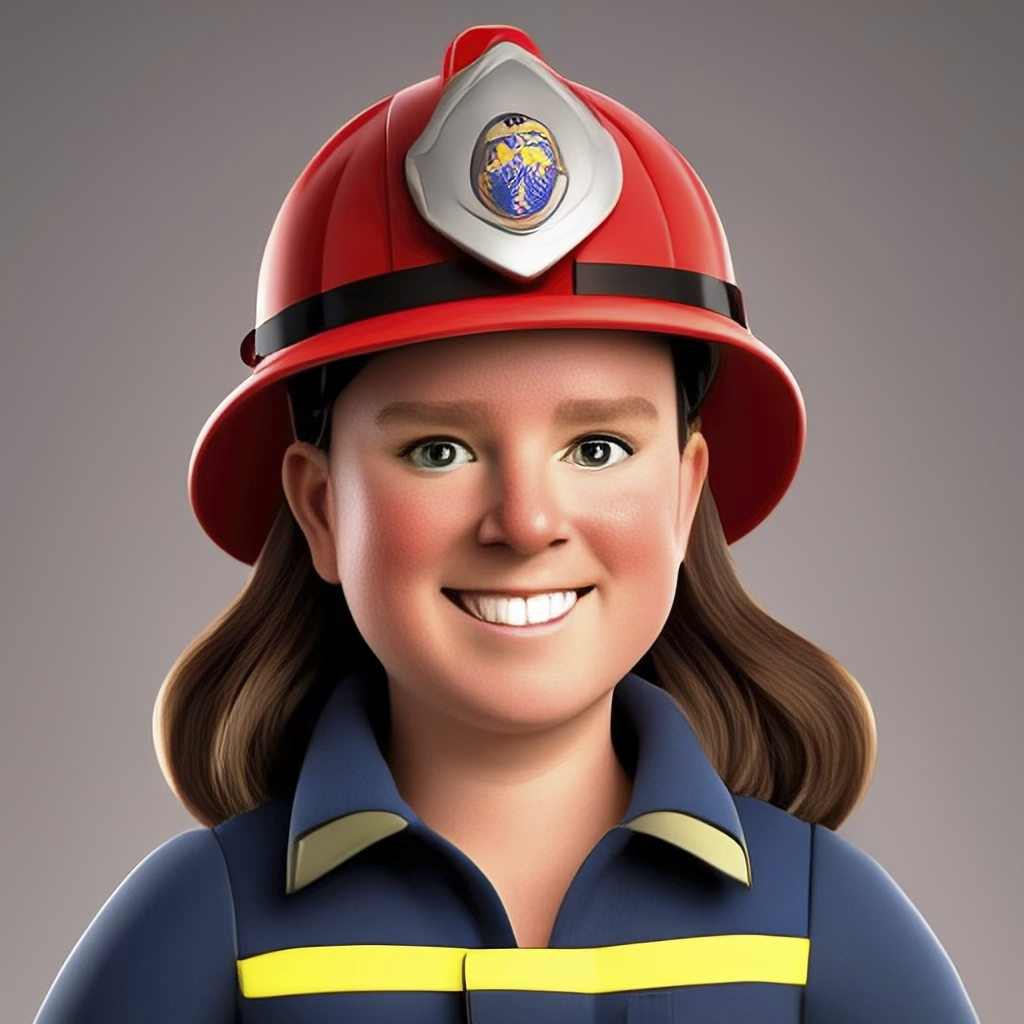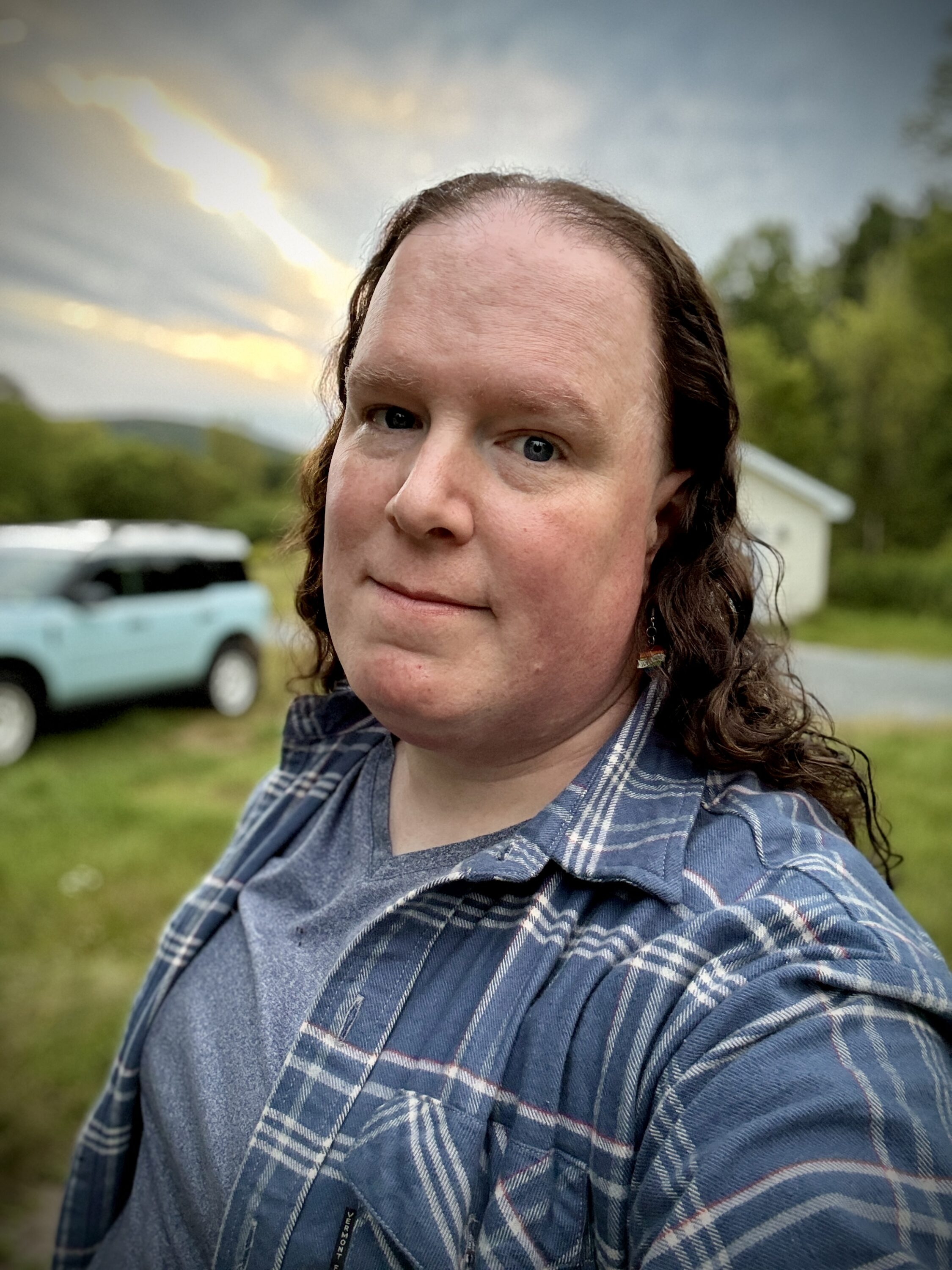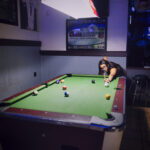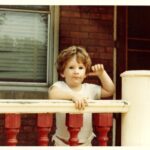I sometimes think my whole life can be traced back to two places—the farm near Buffalo where I first learned how to breathe, and the steel box of a rescue truck where I learned how to survive. Both places carried me when I was weak, both scarred me in different ways, and both taught me hard truths I didn’t want to know. If I close my eyes, I can still smell the pine and hay of that farm mingling with the diesel and sweat of the ambulance. Those scents, those memories, are the map of my existence. Everything starts and ends with those two worlds: the wild little girl at her grandparents farm and the battle-hardened woman in the rescue rig.
At the farm, I was just a little girl with a black-and-white Springer Spaniel named Emma, a stuffed frog missing an eye named Frog, and a wildness in my spirit that could not be broken. The house itself was a three-ring circus of characters and vices. My grandmother would spend her days half-drunk and chain-smoking in the living room, an ashtray always overflowing by her elbow. She’d mumble old stories under her breath while sipping gin from a chipped mug, cigarette dangling from her lips as if it were a natural extension of her being. The rugs and curtains hung heavy with decades of smoke and pine dust that drifted in from the fields. My uncle Bob—worked the kind of blue collar labor that turns people into living machines, leaving permanent calluses and cracks blackened with motor oil and soil. He spoke little, and when he did, his voice was as rough and tired. My aunt Holly was usually found in a lawn chair on the rear porch off the living room in a haze of cheap beer by mid-afternoon.
My father was angry in a way that settled into the walls like toxic mold, unseen but ever-present. He wasn’t a tall man, but his rage made him loom large. Every slam of his fist on the table, every low growl of disappointment, soaked into that house’s very bones.
My cousins swirled around this familial storm and each played their parts to keep the fragile balance. James was the charismatic ladies’ man even at nineteen. John, his younger brother, was the serious and grounded one; at thirteen he already spoke like a forty-year-old, with the weight of the farm in his voice. John would always be inside reading a book, while James and I would be outside building forts in the woods. And then there was me: the oddball, the misfit, the girl, a constant question mark. I was too sharp-tongued for a child, too curious for my own good, too feral to fit the polite mold of a “young girl.”
I think the adults didn’t quite know what to do with me. I had my mother’s facial features, and my fathers intelligence. There was something about the way I watched everyone that always made them uneasy—like I was taking notes on all their failures and dreams. I was a little girl they couldn’t quite pin down, a little wildcat who refused to be tamed. But outside—that’s where I truly belonged.
Outside, under the open sky, I was more than the oddball kid underfoot in a smoky living room. I would run barefoot across the grass and hayfields, Frog tucked securely under one arm, and Emma bounding joyfully beside me with her big floppy ears and tail wagging.
The moment my toes touched dew-soaked earth, I felt something release inside me. The pine trees that encircled our fields stood tall and wise, their branches like open arms ready to hide me when I needed hiding. I learned to disappear into those woods whenever the house got too loud or when my father’s temper started shaking the walls. I’d press my back against the rough bark of a pine and become part of the forest. I’d listen to the hum of cicadas and the buzz of dragonflies hovering over the marshy pond out back.
I’d close my eyes and let the summer air—thick with sweetgrass and wildflower—fill my lungs. In those moments I pretended I was free. In those moments, I was just another creature in the woods, unburdened, unafraid. Even when reality insisted I wasn’t truly free—that I had to eventually tiptoe back to that house of smoke and shadows—I savored the illusion. Outside, I felt alive and safe in a way I never did inside those walls.
One early morning, when I was about seven years old, I slipped out before anyone else woke up. Dawn light was filtering gold through the pines, and the air was cool and filled with birdsong. Still in my thin cotton nightgown, I raced Emma down the hill behind the pond, both of us kicking up dew as we went. Emma barked with excitement, and I laughed out loud, feeling a wild joy thrumming in my chest. We must have looked like a scene from a storybook—the scrappy little girl and her faithful dog on a grand adventure. In my imagination, we were explorers, maybe even heroes. In reality, I was just a barefoot kid running reckless through brambles and mud.
I soon enough got caught up in a thicket of blackberry brambles, and trying to free myself, managed to tear huge holes in the night gown, that by now was so covered in mud and pine sap that I didn’t think mom could wash it all out. I remember tugging off my nightgown and leaving it in the woods, as if claiming this patch of wild as my own kingdom. For a few minutes I danced barefoot and carefree in that hidden corner of the woods, Emma splashing in the pond nearby.
That’s when I slipped on the muddy bank and went tumbling through a patch of tall grass, straight into a cold, slimy puddle left over from the night’s rain. The mud was thick and cool, and it clung to my skin like it wanted to keep me. I came up sputtering and laughing, absolutely coated from head to toe in dark brown muck, with bits of leaves sticking to my hair and tiny scratches crisscrossing my arms and legs.
When I finally trudged back to the farmhouse, I was barefoot, naked as the day I was born, mud-soaked with pine needles and burrs stuck out of my tangled hair. I was a naked muddy pine needle covered mess, but I was grinning like I had swallowed the whole sun. I must have been a sight to behold, this mud-slick child standing proudly in the porch doorway. My grandmother took one look and let out a long, smoky sigh.
Without so much as blinking, she jabbed her lit cigarette towards the yard, the red cherry for a split second growing brighter with the sudden acceleration and said, “Outside. Hose off before you step foot in here, child. I’m not about to have you ruin my rug.” Her voice was raspy from years of smoke and Manhattans. She took a long pull off her cigarette, eyeing me with a mix of irritation and a flicker of resentment.
I was about to obey—truly, I was—when Emma, my beloved partner in chaos, came barreling in right behind me. She’d been following on my heels, just a few moments behind, because Emma—adorable as she was—wasn’t very bright. While I picked my way along the grass where water met land, she charged straight through, swimming as if it were the only path forward. She burst through the door dripping pond water, caked in mud from nose to tail.
Before anyone could stop her, she gave one of her signature full-body shakes. In an instant, droplets of muddy water and flecks of algae went flying across the kitchen and into the living room. I ducked, but there was no escape—mud splattered the walls, the ceiling, the light fixture, and, of course, my grandmother’s prized rug. For a heartbeat, time stopped. We all just stared at the dripping chaos: brown sludge sliding down the wallpaper’s faded roses, the rug now a modern art masterpiece of mud, my grandmother’s mouth open in utter shock.
Then all hell broke loose. Grandma started cursing, shuffling after the dog with a dishrag, while Emma, thinking it was a game, scampered around leaving paw prints everywhere. My father thundered into the room, saw the mess and my muddy, naked self, and bellowed my name in that dangerous low tone that meant I was in for it. My aunt slurred something about “that damn dog,” and Uncle Bob poked his head in from the porch, took one look, shook his head, and wisely retreated back outside. And me? I just threw back my head and laughed.
I laughed so hard I thought I might lift off the ground. It was perfect. It was the truth slapping everyone in the face. Because you can close all the doors, lay down all the rules, try to keep life tidy and safe—but sooner or later, the mud gets in. The wild, the truth, the chaos—it finds a way in. No matter how mad my family was at that moment, they couldn’t stop the wild from seeping into our lives, whether through a rebellious little girl or a happily dirty dog.
That lesson stuck with me long after Emma was gone, long after childhood had burned itself out. Even years later, I would look up at a ceiling and remember that constellation of mud stains and think: truth has a way of sneaking in. Of course, at seven I didn’t put it in such terms—but I felt it deep down. Some part of me quietly understood that the real stuff of life isn’t easily contained.
Emma lived to a ripe old age for a dog. She saw me through the rest of grade school, through countless other adventures on that farm, big and small. Losing her was the first real heartbreak of my life.
By the time I was twelve, a new dog named Penfold had taken Emma’s place as my four-legged companion. Penfold was nothing like Emma in looks—Emma had been sleek and nimble, while Penfold was a big, shaggy mutt with ears that flopped, which gave him a perpetually goofy, inquisitive look. He had soft brown eyes that saw right through you. I named him Penfold after a bumbling cartoon sidekick I remembered from Danger Mouse, some early childhood TV show I used to watch that made me smile, and I desperately needed something to smile about back then.
From day one, Penfold was my shadow. He followed me everywhere—trailing me through the my adventures, dozing under the kitchen table at my feet, pressing his warm side against me on nights when the shouting inside the house got too loud. He was my witness and my comfort, a tether to something gentle in a world that often wasn’t gentle at all.
Penfold lived longer than anyone expected—stretching across my life from
those turbulent teenage days into my early thirties, outlasting entire versions of me I thought I’d never survive. He was there during nights when I sobbed into his fur because I felt like the world had swallowed me whole.
When I say Penfold saw everything, I mean everything. He was there the night my father finally threw me out of the house for good. I remember that night vividly—hot and humid, the air thick with a mid-July thunderstorm brewing. I was sixteen and full of sadness, hurt and angry at a life I couldn’t control. My father and I got into a screaming match—probably the climax of a hundred smaller fights. I can’t even recall what sparked it. Maybe I mouthed off when he snarled at me for coming home late, or maybe he was just drunk enough to unload every resentment he’d been carrying. Words flew like knives. I told him I wasn’t afraid of him anymore, that I wasn’t a little girl he could scare into silence.
He told me to get the hell out of his house, face twisted in a rage that almost looked like satisfaction. Perhaps he’d been waiting for an excuse to eject me; perhaps I’d been the one waiting to leave. Either way, it ended with him grabbing my arm in a vise grip and physically dragging me toward the front door. I can still feel the burn of his fingers on my skin as he shoved me out onto the porch.
“Go on then! You think you know everything? See how far you get on your own. And leave anything I paid for except the clothes on your back!”
The front door slammed shut, and that was that. I was cast out into the dark, the sky about to burst open with rain, truly alone for the first time. I sat on that porch, heart hammering, the night air alive with the buzz of cicadas and distant thunder. I was shaking all over. Part of me wanted to pound on the door and scream to be let back in; another part of me felt an unexpected rush of relief.
The worst had happened—he’d done exactly what I always feared—and I was still standing. He made good on his promise to erase me, but in the wreckage I was free. The door creaked open again, and for one reckless second I thought maybe he’d changed his mind. Instead it was Penfold, my mom letting him out like an afterthought. He padded over, tail low, wearing the same rejection I felt. My battered spiral notebook sat beside me, pages full of unsent letters and rage my father would never read. Penfold pressed his body against mine, and I buried my face in his fur, sobbing like the bottom had finally fallen out.
‘Looks like it’s just us now,’ I whispered.
He lifted his head, those big brown eyes—Falkor eyes—locking on me, and then he licked the tears straight off my face. Not comfort. Not pity. Just truth: I’m with you. Always.
With what felt like the entire world on my shoulders, I started taking everything I could out of my room that I might need to survive and put it in the back of my hand-me-down 1991 Honda station wagon. I had no real plan, just a fierce resolve that I would not crawl back to that house. I managed to convince my old summer camp to hire me for kitchen help, and the following morning, I was on my way to Merrill. The first night, I slept in my old cabin where I’d slept as a child. I built a small fire in the living room fireplace and wrapped myself in an old blanket.
Through the unscreened window, I could see one bright star winking in the ink-black sky. I remember I was still crying a little, but at some point I realized I was smiling, too. It hit me that for all the fear and hurt pulsing through me, I also felt something almost like peace. I was on my own. The worst had come, and I was still me. There’s a strange calm that comes when you have nothing left to lose. Lying there alone with the open sky above, I discovered a dangerous, wonderful sort of freedom.
In the weeks that followed, I drifted through the Adirondacks doing whatever kept me fed—hauling wood, scrubbing shit-stained toilets, washing dishes, dragging trash. At night I hunched over a lantern, bleeding my teenage rage into spiral notebooks. On weekends I watched the campers roast marshmallows, aching for a childhood I never got—just scraps of it two summers earlier. But now I was sixteen, cut loose, expected to toughen up and survive, stuck in the brutal limbo between girl and woman.
Autumn arrived, crisp and golden, and with it the withering of old leaves and the ever-present question of what to do next. My father, in a rare moment that felt more like dismissal than mercy, suggested I enjoy a few days of freedom before being sent back to boarding school. Freedom, to him, meant absence from his sight; to me, it meant throwing a blanket in the backseat of the Honda and taking off with Penfold riding shotgun. For a handful of days, it was just us—windows cracked to let in the cool mountain air of Upstate New York, gravel roads that lead to nowhere under our tires, Penfold’s ears flapping in the wind like some shaggy co-pilot. We ate out of gas station paper bags, dozed in the car under the whisper of falling leaves, and parked by trailheads where he’d nose through the underbrush while I scribbled into my notebook. It wasn’t much, but it felt like stolen treasure—a brief, ragged stretch of belonging before I was shipped back into confinement.
Those drives on empty back roads felt healing. I spilled my thoughts to Penfold as old rock songs played on the radio. He listened with those wise, patient eyes. He had no answers, but his presence was enough. Driving felt like moving forward—each mile put distance between me and the broken pieces of my past.
Two years later at eighteen, I ran away from boarding school in the middle of winter and enrolled in an EMT course in Buffalo, New York, determined to do something exciting and useful with my life. By my mid-twenties, my life had narrowed into a rotation of 24-hour shifts, roaring sirens, and endless highways seen through a smeared ambulance windshield. Some days (and nights) the ambulance barely stopped moving. We’d go from one call to the next: a car wreck at dawn, a heart attack by noon, an overdose at sunset, a shooting past midnight.
Then maybe, if we were lucky, a brief lull around 3 a.m. before the next crisis came in. My entire world had shrunk to the size of that rescue rig and whatever emergency lay at the next address on the pager. Forty-eight hours on duty, sleeping in snatches, became routine. The ambulance was my second home, a home on wheels that often smelled of antiseptic, diesel, and stale sweat. I learned to cat-nap sitting upright, to inhale a lukewarm cup of coffee in three gulps between calls, and to keep my hands steady for an IV line even when adrenaline wanted to make them shake.
The interior of the rig was all hard plastic and stainless steel—benches lining the sides with hidden compartments full of supplies, a narrow stretcher in the center, overhead cabinets with clear panels showing neatly strapped equipment. Those walls witnessed some of the best and worst moments of my life.
They saw me deliver a baby girl on a snowy highway shoulder at 6 a.m., my own hands gently catching her as she entered the world wailing, her mother sobbing with joy and relief. They also saw me slumped in a corner after a call where nothing we did was enough—the echo of a mother’s scream still ringing in my ears after I had to tell her that her little boy was gone.
The ambulance floor was often littered with wrappers, gauze packs, and coffee cups—a functional mess we didn’t always have time to clean on busy days. We cleaned up when we could, but on the busiest days, organization took a backseat to sheer survival.
After particularly brutal calls, I sometimes parked the ambulance in a dark empty lot, opened the back doors, and sat on the rear step to let the night air wash over me in silence. The rescue truck would loom behind me like a fortress, its engine ticking as it cooled, and I’d run my hand along the bumper in gratitude for carrying me through.
I used to half-joke that if a stray bullet ever came our way on a scene, the rescue would stop it like a shield. Absurd, I know—an ambulance isn’t bulletproof—but that tiny thought kept me steady in neighborhoods where gunfire echoed in the night. Oddly enough, I felt safer in that truck than anywhere else on earth. Safer than home ever was, safer even than the open farm had been, because inside those thin metal walls I knew exactly who I was and what I needed to do. Those doors would close, the siren would wail, and for a time I belonged to nothing but the mission: keep someone alive, get us all through ’til morning. My own pain, my own past, all of it was left on the curb while I fought chaos with everything I had.
And then came Irene. Hurricane Irene hit New York in 2011 and tore through the region like the end of the world. I’d seen big storms—blizzards that buried whole towns, summer squalls that sent trees crashing through roofs—but nothing like this. Torrents of rain turned familiar creeks into raging rivers. Whole villages went underwater. Our radios crackled nonstop with emergencies: evacuations, rescues, people trapped in their houses, some clinging to rooftops as the floodwaters rose.
By the second night of the storm, every first responder I knew was bone-tired and running on pure willpower. We parked on what we hoped was high ground and waited in the hammering rain, the four of us in the rescue, the crew soaked and anxious. Lightning spiderwebbed across a black sky, illuminating the devastation in flashes. In the morning, dam failure sirens went off—a long, eerie wail cutting through the wind. Over the radio came a panicked order: the dam was failing, evacuate now.
My stomach lurched. If that dam broke, a wall of water would be on us in minutes. I shouted to my crew, “We’re leaving—get in, now!” as I dove into the driver’s seat. My partner barely had time to grab the dash as I fired up the engine.
But the two local volunteers—just stood there in the deluge, shaking their heads. They didn’t believe it. “Bullshit!” yelled, refusing to budge.
To them I was just a young woman who had moved there from out of town, and they weren’t about to take orders from me. My heart was a drum in my ears.
“Get in the truck!” I screamed through the rain. They still refused. In that moment I felt a flash of fury so intense it surprised me. I jumped out and marched toward them, rain stinging my face. “If you want to die, fine, but not on my watch!” I shouted, pointing at the truck.
He yanked away, eyes full of stubborn pride and disbelief. We stood there face to face in the howling wind, two fools in a floodplain. And strangely, a calm washed over me. In the middle of all that chaos, I felt everything go quiet inside. I remember thinking, If the water comes now, I’ll drown doing my job. Maybe that’s enough. I wasn’t going to abandon them, and I wasn’t going to run.
After a few endless minutes, an all-clear crackled over the radio: the dam held. Someone had called to report the dam failure as a prank; the state has responded by sending a NYSP chopper to investigate. We sat in the eerie gray dawn, rain still pounding on the roof, and we just looked at each other—soaked, exhausted, realizing we were alive.
Life went on, as it does; the storm eventually passed and the floods receded, and to anyone else it was just another bad weekend that could have been worse.
But something in me broke loose that night and never fit back into place. Irene wasn’t just a storm; it was a mirror held up to all of us. It showed me how paper-thin the line is between order and chaos, between confidence and foolishness, between life and death. Two stubborn men almost got us all killed because they refused to believe the danger until it was at the door. And I learned that in the face of true chaos, I could find a kind of calm. I was willing to stand my ground, even if it meant I might not walk away. In the worst moment, I met a version of myself I wasn’t sure I’d find—the one who doesn’t flinch.
I’ve lived through things I shouldn’t have. I’ve survived the kind of childhood beatings that leave more than just bruises on the skin. I’ve endured betrayals that cut just as deep as any knife. I’ve run into burning buildings when every sane part of me screamed to turn back. I’ve stood in the charred ruins of someone’s home, choking on smoke, knowing we couldn’t save everyone inside. I’ve pulled bodies from mangled cars that looked like crumpled tin cans, my heart breaking at the sight of an empty car seat in the back. I’ve known silences that cut deeper than words—the silence after a slap when I refused to cry, the silence of an empty house that should’ve been filled with a dog’s bark or a father’s apology, the silence on the other end of the line when I tried once to call home and got nothing but a dial tone.
I have literally sat in the mud—first as that wild child in the pine woods, and later as an adult kneeling in a roadside ditch with a dying stranger’s hand in mine. I’ve bled on my own boots without even noticing, and I’ve watched people die despite all my efforts to save them, because sometimes offering quiet comfort is all you can do. I’ve laughed when I should have cried, using dark humor as a shield against the horrors I’ve seen. And I’ve carried ghosts that should have buried me by now—ghosts of the people I couldn’t save, of the family I left behind, of every innocence I lost along the way. They weigh on me, yes, but they also drive me. Every ghost is a reminder of why I must keep going, why I cannot give up.
But I’m still here.
And when I look back now, I can see a line running through it all, connecting all the selves I’ve been. I see the little girl on the farmhouse porch, muddy and grinning, defying the world to tame her. I see the teenager under the stars, Penfold’s head on her lap, refusing to break despite all the broken things around her. I see the young paramedic lieutenant sitting on the back step of her ambulance after a grueling night, head tilted up to a sky that offers no answers, wondering why people hurt each other and why she has to see so much of it. I see the woman standing in the driving rain of a hurricane’s wake, heart thudding in her chest, knowing she might die and still not backing down. All of them were me. All of them are me, woven together into one messy, complicated, resilient life.
The truth is, life doesn’t hand you neat, happy endings. It hands you storms and scars. It hands you mud on your best rug and phone calls in the dead of night that change everything. It hands you nights in an ambulance where the only familiar sound is your own heartbeat in your ears. But it also hands you small mercies and unexpected beauty. It hands you Emma’s wild, wet shake that left everyone sputtering but also laughing. It hands you Penfold’s long years of companionship—the gentle weight of his head on your knee on a lonely night, reminding you that you aren’t alone. It gives you laughter that bubbles up in the darkest moments because sometimes laughter is the only way to keep from breaking. And sometimes, if you’re patient, life hands you a sunrise after the storm, a moment of stillness when the world is quiet and, just for that moment, it feels like it all makes sense. Those are the moments I live for: the pink dawn after a night of sirens, the hush when I sip a cup of coffee with shaking hands and realize I made it through once again.
I don’t need closure. I don’t need to tie up every loose end of this story in a pretty bow. I don’t need to justify or explain away the ugliness to find the beauty. I just need it to be real. All of it—uncensored, unfiltered, as it happened. This messy, brutal, beautiful survival is as real as it gets. It’s not a clean narrative, but it’s mine, and I’ll take it, every scar and every joy.
So if this is the last page, if this is the way the book ends, let it end like this: I was a child who ran naked through fields of pine needles and mud, unafraid and untamed.
I was a teenager who carried a dog and a notebook like lifelines, finding hope under campfire stars when there was none at home.
I was a first responder who stood in storms and floodwaters, who ordered her crew to higher ground even when they wouldn’t listen, learning how strong I could be when the world was falling apart.
I was a woman who kept going, even when life broke me into pieces, stubbornly putting one foot in front of the other on the roughest days.
And I am still here.
Still me.
Still Emily.










Leave a Reply to Cate Cancel reply